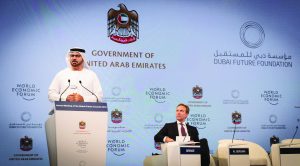DUBAI/ WAM
The UAE Government and the World Economic Forum (WEF) announced the launch of the 2025 edition of the Global Future Councils, to be held in Dubai on October 14 – 16, 2025.
This landmark event continues a remarkable journey of collaboration between the UAE and the WEF, and builds on more than 16 years of success, with the councils’ having convened over 280 councils with the participation of 6,600+ global experts and specialists, covering topics most related to human life and future.
Mohammad Abdullah Al Gergawi, Minister of Cabinet Affairs and Co-Chair of the Global Future Councils, emphasised that the councils reflect the shared values of the UAE and the WEF, namely to encourage future-shaping thinking and inspire societies to actively participate in the design and implementation of forward-looking solutions.
“For more than five decades, our relationship with the World Economic Forum has always centred on building an inclusive platform for open global dialogue about the future—with humanity at its core,” said Al Gergawi. “This reflects our wise leadership’s commitment to fostering meaningful international cooperation to co-create a better tomorrow.”
“In today’s world, challenges such as technology, geoeconomics, and the environment are interconnected. The uniqueness of the Forum’s Global Future Councils is that they bring together experts from different fields to identify new areas for future cooperation,” said Børge Brende, President and Chief Executive Officer, World Economic Forum.
The current term of the GFCs will develop thought leadership to help navigate uncertainty, decode geopolitical tensions, and make sense of an increasingly complex world.
The 2025–2026 edition of the Global Future Councils will feature 36 councils, bringing together 700 experts from over 580 organisations and institutions across 93 countries.
The councils are evenly structured to ensure diverse representation—one-third for business leaders, one-third for thought leaders and academics, and one-third for government experts, international organisations, and civil society representatives.
The UAE Government and the WEF held an introductory meeting for members of the upcoming edition to update participants on the goals of the new session and outline the key priorities that will shape the GFCs work over the next two years.
During the opening session, Ruqayya AlBlooshi, Executive Director for International Affairs at the UAE Prime Minister’s Office, and Martina Szabo, Head of Knowledge Communities at the WEF, outlined the roadmap for the new GFCs.
AlBlooshi highlighted the UAE’s pivotal role in creating a diverse and impactful future-shaping network, contributing to nearly $8 trillion in global economic value and reaching 683 million people across 158 countries.
“Over the past 16 years, the collaboration between the UAE and the World Economic Forum has led to creating hundreds of think tanks and brought together thousands of experts and thought leaders from over 93 countries,” she noted. “Hosting the Global Future Councils in the UAE—and turning their outcomes into impactful, real-world solutions—underscores the UAE’s position as a global hub for communication and collaboration.”
AlBlooshi further emphasised the GFCs impact on major global events, noting their role in shaping global agendas, serving international priorities, and delivering tangible results. One example was the GFC on Agile Governance, that produced thought leadership supporting the development of innovative regulatory practices and helping governments quickly adapt to emerging technologies inspiring the action seven countries.
Szabo underscored the councils’ evolution from their 2008 origins as “Global Agenda Councils” to the present-day “Global Future Councils,” and their continued role in shaping key global agendas, such as the Annual Meeting of the New Champions in China, Sustainable Development Impact Meetings in New York, Growth Summits in Geneva, and the World Economic Forum’s Annual Meeting in Davos.
She outlined the new goals of the Global Future Councils, which include enhancing cross-disciplinary collaboration, sharing ideas and knowledge, defining and exploring emerging issues and technologies expected to have a major global impact, establishing data- and evidence-based cooperation between public and private sectors, noting that what truly sets the Global Future Councils apart is their proven ability to drive real, transformative change worldwide.
Over the past 16 years, the Global Future Councils have convened more than 280 councils, with 6,600+ members from around 100 countries, 1,500+ companies, 800 academic institutions, 600 civil society groups, and 50 international organisations.
 The Gulf Time Newspaper One of the finest business newspapers in the UAE brought to you by our professional writers and editors.
The Gulf Time Newspaper One of the finest business newspapers in the UAE brought to you by our professional writers and editors.
